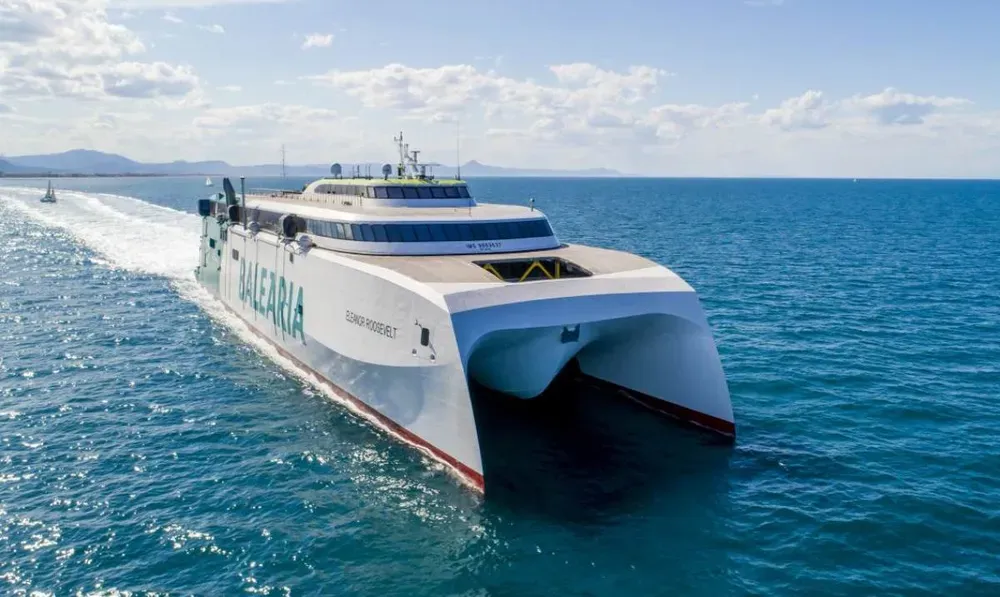Fear of Flying: Travel by Ferry Without Needing to Fly
Travel Advice
Travel Advice


Always dreamt of going abroad but the fear of flying holding you back? You’re not alone! In fact, there are so many people with a fear of flying. Getting on a plane can be a stressful experience and that anxiety can end up ruining the excitement running up to your dream holiday.
The good news is, you don’t always need to fly to reach your destination. Getting a ferry is a comfortable and stress-free alternative. Not only does travelling by boat mean you can avoid getting on a plane, but it also means you can enjoy the journey in a different way – with the sea breeze, space to move around and even the possibility of taking your vehicle with you.
If planes make you anxious then a ferry might just be the perfect solution to reach your destination. Unlike flying, there are no anxiety-inducing take-offs, turbulence or that feeling of confinement. Instead, ferry crossings are designed to make you feel calm, with space to get up and have a wander and amenities to keep you entertained.
Recommendation: If you’re a nervous traveller, night ferries are also a great way to reach your destination. You’ll usually board in the evening, settle into your comfy cabin and sleep for most of the journey. When you wake up, you’ll have arrived in your desired destination, all refreshed and ready to explore!

Along with prices and travel times, one of the most important things is how you feel when you’re travelling. So, we’ve put together a comparison designed from the perspective of those who suffer from a fear of flying and who are looking for a more peaceful experience.
| Criteria | Plane | Ferry |
|---|---|---|
| Stress and anxiety | Take-offs, turbulence and enclosed cabins often cause nerves. | Calm atmosphere, no turbulence. You can walk around, get some fresh air or relax in a cabin. |
| Space and mobility | Narrow seats, very limited movement. | Spacious common areas, freedom to move around and the option of a private cabin. |
| Personal control | Strict restrictions, little room for decision-making during the flight. | You can choose your cabin, travel with your car and decide how to spend your time. |
| Emotional experience | Fast, but often stressful and rushed. | Part of the holiday: sea, views, leisure on board and a more relaxed pace. |
| Families and groups | Separate seats if the flight is full; little space to share. | Families and friends can stay together, share a cabin and keep each other company during the crossing. |
| Pets | Very strict restrictions, not all routes allow animals. | More pet-friendly options; some ferry companies even offer cabins for travelling with your pet, providing security and companionship. |
| Luggage and flexibility | Size/weight restrictions and extra charges. | More flexible: boot space if you travel with your car, less pressure on weight limits. |
| Security checks and waiting times | Longer security and boarding times. | Smoother and less restrictive boarding. |
| Sustainability | Greater carbon footprint per passenger on short flights with low occupancy. | Lower carbon footprint per passenger, especially with high occupancy or in groups. You can calculate your carbon footprint here. |
| Impact of weather conditions | In turbulent conditions, the feeling of lack of control is accentuated and you cannot move. | The sea can affect the crossing, but you can walk around, go out on deck or rest in your cabin to feel more stable. |
If speed is what you're after, flying is usually the way to go. But if you want to travel without the stress, with a lot more freedom and enjoy the journey rather than dread it, then the ferry is the best way.
Not only does getting the ferry mean you can avoid flying, but it can also be a relaxing experience if you prepare well. To help you out, we’ve put together some tips to reduce anxiety and make your journey more enjoyable.
With these tips, the ferry is the best alternative for those who feel anxious about flying. You can move around, relax and enjoy the journey, so your holiday can start before you’ve even reached your destination.

Arrive early to avoid rushing, review your itinerary and prepare a little pre-departure ritual: 4-7-8 breathing for 2 minutes, stretching and a calming playlist. Avoid excessive caffeine and heavy meals just before boarding.
Choose central areas and lower levels of the ship where the movement is less noticeable. If you plan on staying in your seat, look for seats close to the aisles so you can get up easily. If you’re in a cabin, prioritise the central ones over the bow or stern.
You can tell them that you’re worried or that you’re having an anxiety attack; the staff can show you quieter areas, give you water, recommend an outdoor area or, if necessary, direct you to medical services on board. Asking for help early on often makes all the difference.
Noise-cancelling headphones or earplugs, an eye mask, a light jacket, a bottle of water, a light snack, tissues, a list of breathing exercises, and your downloaded entertainment (music, podcasts, reading material) are all great things to bring with you. You can also download relaxation apps such as Calm, Headspace, or Insight Timer.
Seasickness usually comes with nausea and cold sweats whereas anxiety comes with palpitations and racing thoughts. For seasickness, fix your gaze on the horizon, limit screen time and stay in the central area; for anxiety, practise slow breathing, grounding 5-4-3-2-1 and find a quiet space.
If arriving earlier is important to you, the fast ferry reduces the total time. On the other hand, if you prefer a more stable ride and spacious cabin options, the conventional ferry may be more comfortable for you. Prioritise the central area in both cases and if possible, a cabin for a controlled environment.
Be prepared. Eat lightly, stay hydrated, choose a central location and keep your kit handy. Plan breaks to walk around and breathe on deck when it’s safe to do so. Keep your expectations realistic and focus on actions within your control.
Yes. A companion can guide breathing exercises, distract you by chatting to you and support you if you need to change areas. Agree on simple signals before boarding so you can ask for help without making yourself more nervous.
Here are some examples of popular destinations you can reach by ferry rather than flying:
You can get a direct ferry from the UK to France with ferry operators including Brittany Ferries, P&O Ferries, Irish Ferries and DFDS Seaways. Ferries from the UK will take you to northern France. From here, you can go on to explore the rest of the country or continue your journey by car or train to European cities such as Belgium and Germany. Looking for more information? Here's everything you need to know about travelling the Channel.
Popular UK to France routes include:
Brittany Ferries operate direct ferries from the UK to both Santander and Bilbao in northern Spain. Once you've arrived, you can easily explore the northern regions. Or, if you want to venture further south, cities such as Madrid, Valencia and Seville are reachable by car or public transport. From Spain, you can also continue your journey to Portugal or even head to the Balearic Islands.
Popular UK to Spain routes include:
P&O Ferries, Stena Line and DFDS Seaways operate services from the UK to Holland, giving you the opportunity to explore the Netherlands. From Holland it's also easy to reach many other European cities by train including Brussels, Paris and Cologne.
Popular UK to Holland routes include:
Getting a ferry to the Channel Islands may take a little longer than flying but it's much more relaxing. Once you've explored the islands, you can even hop on a ferry to France. The Jersey to St Malo route takes as little as 55 minutes meaning you can be in France in no time at all!
Popular UK to Channel Islands routes include:

A fear of flying should not come between you and your dream holiday. Thanks to ferries, it’s easy to reach your destination without having to board a plane.
The ferry is a safe, comfortable and flexible option, allowing you to start your journey calmly and without any stress. Taking the ferry also offers many advantages over flying such as being able to take your car, share a cabin with family or friends and enjoy a relaxing journey with beautiful sea views. It makes the journey all part of the holiday experience!
Ready to take the plunge? Whether you're dreaming of holidays in France, Italy, Greece, Croatia or beyond, book your ferry today and start your holiday without fear of flying.